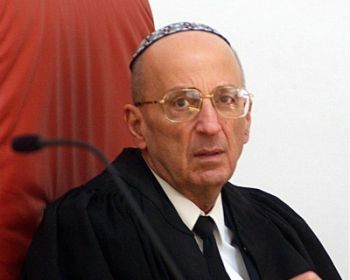
Publisher:
Bonnie King
CONTACT:
Newsroom@Salem-news.com
Advertising:
Adsales@Salem-news.com

~Truth~
~Justice~
~Peace~
TJP
Jul-19-2012 10:37

 TweetFollow @OregonNews
TweetFollow @OregonNews
What Really Lies Behind Israel's 'No Occupation' Report
Jonathan Cook Special to Salem-News.comExperts have also pointed to the difficulties Israel will face if it adopts Levy’s position.
 Special thanks to Redress News & Analysis, and also +972 Mag in Israel for the photo of Justice Edmond Levy |
(NAZARETH) - The recently published report by an Israeli judge concluding that Israel is not in fact occupying the Palestinian territories – despite a well-established international consensus to the contrary – has provoked mostly incredulity or mirth in Israel and abroad.
Left-wing websites in Israel used comically captioned photographs to highlight Justice Edmond Levy’s preposterous finding. One shows an Israeli soldier pressing the barrel of a rifle to the forehead of a Palestinian pinned to the ground, saying: “You see – I told you there’s no occupation.”
Even Binyamin Netanyahu, Israel’s prime minister, seemed a little discomfited by the coverage last week. He was handed the report more than a fortnight earlier but was apparently reluctant to make it public.
|
Downplaying the Levy report’s significance may prove unwise, however. If Netanyahu is embarrassed, it is only because of the timing of the report’s publication rather than its substance.
It was, after all, the Israeli prime minister himself who established the committee earlier this year to assess the legality of the Jewish settlers’ “outposts”, ostensibly unauthorized by the government, that have spread like wild seeds across the West Bank.
He hand-picked its three members, all diehard supporters of the settlements, and received the verdict he expected: that the settlements are legal. Certainly, Levy’s opinion should have come as no surprise. In 2005 he was the only Supreme Court judge to oppose the government’s decision to withdraw the settlers from Gaza.
Legal commentators too have been dismissive of the report. They have concentrated more on Levy’s dubious reasoning than on the report’s political significance.
They have noted that Theodor Meron, the Foreign Ministry’s legal adviser in 1967, expressly warned the government in the wake of the 1967 war that settling civilians in the newly-seized territory was a violation of the Fourth Geneva Convention.
Experts have also pointed to the difficulties Israel will face if it adopts Levy’s position.
Annexation versus demographic “time bomb”
Under international law, Israel’s rule in the West Bank and Gaza is considered “belligerent occupation” and, therefore, its actions must be justified by military necessity only. If there is no occupation, Israel has no military grounds to hold on to the territories. In that case, it must either return the land to the Palestinians, and move out the settlers, or defy international law by annexing the territories, as it did earlier with East Jerusalem, and establish a state of Greater Israel.
|
Annexation, however, poses its own dangers. Israel must either offer the Palestinians citizenship and wait for a non-Jewish majority to emerge in Greater Israel; or deny them citizenship and face pariah status as an apartheid state.
Just such concerns were raised on 15 July by 40 Jewish leaders in the United States, who called on Netanyahu to reject Levy’s “legal maneuverings” that, they said, threatened Israel’s “future as a Jewish and democratic state”.
But from Israel’s point of view, there may, in fact, be a way out of this conundrum.
In a 2003 interview, one of the other Levy committee members, Alan Baker, a settler who advised the Foreign Ministry for many years, explained Israel’s heterodox interpretation of the Oslo accords, signed a decade earlier.
The agreements were not, as most assumed, the basis for the creation of a Palestinian state in the territories, but a route to establish the legitimacy of the settlements. “We are no longer an occupying power, but we are instead present in the territories with their [the Palestinians’] consent and subject to the outcome of negotiations.”
On this view, the Oslo accords redesignated the 62 per cent of the West Bank assigned to Israel’s control – so-called Area C – from “occupied” to “disputed” territory. That explains why every Israeli administration since the mid-1990s has indulged in an orgy of settlement-building there.
According to Jeff Halper, head of the Israeli Committee Against House Demolitions, the Levy report is preparing the legal ground for Israel’s annexation of Area C. His disquiet is shared by others.
Recent European Union reports have used unprecedented language to criticize Israel for the “forced transfer” – diplomat-speak for ethnic cleansing – of Palestinians out of Area C into the West Bank’s cities, which fall under Palestinian control.
The EU notes that the numbers of Palestinians in Area C has shrunk dramatically under Israeli rule to fewer than 150,000, or no more than 6 per cent of the Palestinian population of the West Bank. Settlers now outnumber Palestinians more than two-to-one in Area C.
Preparing for annexation
Israel could annex nearly two-thirds of the West Bank and still safely confer citizenship on Palestinians there. Adding 150,000 to the existing 1.5 million Palestinian citizens of Israel, a fifth of the population, would not erode the Jewish majority’s dominance.
If Netanyahu is hesitant, it is only because the time is not yet ripe for implementation. But over the weekend, there were indications of Israel’s next moves to strengthen its hold on Area C.
It was reported that Israel’s immigration police, which have been traditionally restricted to operating inside Israel, have been authorized to enter the West Bank and expel foreign activists. The new powers were on show the same day as foreigners, including a New York Times reporter, were arrested at one of the regular protests against the separation wall being built on Palestinian land. Such demonstrations are the chief expression of resistance to Israel’s takeover of Palestinian territory in Area C.
And on 15 July it emerged that Israel had begun a campaign against the Office for the Coordination of Humanitarian Affairs (OCHA), the UN agency that focuses on humanitarian harm done to Palestinians from Israeli military and settlement activity, most of it in Area C. Israel has demanded details of where OCHA’s staff work and what projects it is planning, and is threatening to withdraw staff visas, apparently in the hope of limiting its activities in Area C.
There is a problem, nonetheless. If Israel takes Area C, it needs someone else responsible for the other 38 per cent of the West Bank – little more than 8 per cent of historic Palestine – to “fill the vacuum”, as Israeli commentators phrased it last week.
Palestinian quisling
The obvious candidate is the Palestinian Authority (PA), the Ramallah government-in-waiting led by Mahmoud Abbas. Its police forces already act as a security contractor for Israel, keeping in check Palestinians in the parts of the West Bank outside Area C. Also, as a recipient of endless international aid, the PA usefully removes the financial burden of the occupation from Israel.
|
But the PA’s weakness is evident on all fronts: it has lost credibility with ordinary Palestinians, it is impotent in international forums, and it is mired in financial crisis. In the long term, it looks doomed.
For the time being, though, Israel seems keen to keep the PA in place. Last month, for example, it was revealed that Israel had tried – even if unsuccessfully – to bail out the PA by requesting a 100-million-dollar loan from the International Monetary Fund on the PA’s behalf.
If the PA refuses to, or cannot, take on these remaining fragments of the West Bank, Israel may simply opt to turn back the clock and once again cultivate weak and isolated local leaders for each Palestinian city.
The question is whether the international community can first be made to swallow Levy’s absurd conclusion.
A version of this article first appeared in The National of Abu Dhabi. The version here is published by permission of Jonathan Cook.
 Jonathan Cook is a writer and journalist based in Nazareth, Israel. Jonathan won the Martha Gellhorn Special Prize for Journalism. His latest books are “Israel and the Clash of Civilisations: Iraq, Iran and the Plan to Remake the Middle East” (Pluto Press) and “Disappearing Palestine: Israel’s Experiments in Human Despair” (Zed Books). His website is www.jkcook.net.
Jonathan Cook is a writer and journalist based in Nazareth, Israel. Jonathan won the Martha Gellhorn Special Prize for Journalism. His latest books are “Israel and the Clash of Civilisations: Iraq, Iran and the Plan to Remake the Middle East” (Pluto Press) and “Disappearing Palestine: Israel’s Experiments in Human Despair” (Zed Books). His website is www.jkcook.net.
In early 2011, one of Jonathan's reports, "Israel brings Gaza entry restrictions to West Bank", along with several other articles on Israel-Palestine, was selected in ninth place in Project Censored's awards for the 25 most important stories censored in 2009-10. Details are available here
Many of Jon's articles are featured by Redress Information and Analysis.
Special thanks to Redress News & Analysis
 |
 |
 |
 |
 |
 |
 |
Articles for July 18, 2012 | Articles for July 19, 2012 | Articles for July 20, 2012





Quick Links
DINING
Willamette UniversityGoudy Commons Cafe
Dine on the Queen
Willamette Queen Sternwheeler
MUST SEE SALEM
Oregon Capitol ToursCapitol History Gateway
Willamette River Ride
Willamette Queen Sternwheeler
Historic Home Tours:
Deepwood Museum
The Bush House
Gaiety Hollow Garden
AUCTIONS - APPRAISALS
Auction Masters & AppraisalsCONSTRUCTION SERVICES
Roofing and ContractingSheridan, Ore.
ONLINE SHOPPING
Special Occasion DressesAdvertise with Salem-News
Contact:AdSales@Salem-News.com
Terms of Service | Privacy Policy
All comments and messages are approved by people and self promotional links or unacceptable comments are denied.
Ralph E. Stone July 20, 2012 7:40 am (Pacific time)
Most of the Zionists accepted the 1964 UN partition resolution because they were convinced that the crucial issue at that time was to establish a firm foundation for Jewish sovereignty. However, in closed meetings, the Zionists, including David Ben-Gurion, never concealed their intention to expand at the first opportunity the territory given to the Jews. That is why the Declaration of Independence did not define the state's borders and Israel has not defined its borders to this day.
[Return to Top]While the Yishuv’s leadership formally accepted the 1947 Partition Resolution, large sections of Israel’s society — including David Ben-Gurion — were opposed to or extremely unhappy with partition and from early on viewed the war as an ideal opportunity to expand the new state’s borders beyond the UN earmarked partition boundaries and at the expense of the Palestinians. In fact, as early as 1938, [David Ben-Gurion] stated, "After we become a strong force, as a result of the creation of a state, we shall abolish partition and expand into the whole of Palestine." In 1948, Menachem Begin declared, "The partition of the Homeland is illegal. It will never be recognized. The signature of institutions and individuals of the partition agreement is invalid. It will not bind the Jewish people. Jerusalem was and will forever be our capital. Eretz Israel (the land of Israel) will be restored to the people of Israel. All of it. And forever.”
©2026 Salem-News.com. All opinions expressed in this article are those of the author and do not necessarily reflect those of Salem-News.com.